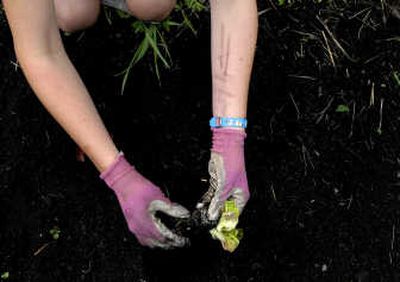HEALING GARDEN

Ian Casey, a young man from San Francisco, had already done his time in two drug-treatment facilities before he found his way to the garden at Penrith Farms.
That was October of 2005, and although Casey graduated from Penrith, he is still there, finding solace and understanding as he digs in the rich soil.
“They were centered on drugs,” Casey, 22, says of previous treatment programs, “but not on the root issues … It’s an ongoing process. I don’t want to feel like I’m cured.”
You may have seen Penrith Farms’ produce at a farmers’ market or an area store. It is green and fresh and organically grown. But the crisp lettuces and vibrant carrots mean more than salad to the people who helped grow them. They signal a fresh start.
Since 1983, Penrith Farms – located at the headwaters of the Little Spokane River near Newport, Wash. – has helped young adults develop work ethics and improved communication skills.
For 20 years, Penrith was overseen by the state. But the 320-acre facility is now privately run. Although each one is different, there are now dozens of private, residential programs for troubled teens and young adults in the Inland Northwest, and more than 600 nationwide.
“It’s been growing quite rapidly,” says Lon Woodbury, a Bonners Ferry man who maintains a Web site (www.strugglingteens.com) and publishes a newsletter about the emotional-growth programs. “I’m having trouble keeping up with it.”
Woodbury got his start in 1984, working at Rocky Mountain Academy in North Idaho, a wilderness experience school for troubled kids. The company that ran that school and several others in the area went out of business a few years ago.
Now, there is a new wilderness program on the same campus, called Ascent. Ascent is run by Universal Health Services, a hospital management company, which also oversees two other therapeutic programs in the area.
All of the private programs – whether they are for teens or young adults, whether they are military-style boot camps, whether they are Christian-based or focus on addiction or eating disorders – have one thing in common: A high price tag.
Penrith costs $5,000 a month, with an average stay of about a year. Ascent, which typically consists of a 45-day program, costs $425 a day (plus a $1,500 enrollment fee). Straight Arrow Apex, an emotional-growth program for young adult men near Colville, charges $10,000 for the first two months and $4,500 each additional month.
Tuition prices like that mean that the clients generally come from high-income families, which is often a part of the underlying problem, experts say.
“A lot of these kids are 16 going on 4,” says Woodbury, who took out a second mortgage to send one of his own daughters to a wilderness program. “They’re spoiled brats who never have to live with the consequences of their behavior.”
Alicia Best is the head gardener at Penrith Farms. The greenhouse and rows and rows of outdoor garden keep her busy, especially because she never knows how many helpers she’ll have on a given day. Some days, she may have six clients tending the fields. Other days, she’ll have fewer. Sometimes, one of the young people simply decides he or she doesn’t want to get out of bed, a decision that leads to privileges being taken away.
“A lot of them think they’re just entitled,” Best says.
But she has seen the magical changes that happen when these young people, who come from all over the country, start doing things they’ve never done before.
“It’s a connection with nature,” she says. “They get unplugged for a little while. They learn to pay attention to the birds, to the amount of rain we’re getting … They start thinking about things they otherwise would’ve taken for granted.”
And at Penrith, the goal is to turn the group of young men and women into a community, one that watches out for each member. That means, if someone’s having a bad day, other residents try to pick them up.
“I see successes here,” Best says. “A lot of them are here to deal with their laziness. But, given the opportunity, they do.”
There has been little research, though, to show that wilderness experiences or therapeutic communities or other emotional-growth programs do any measurable good.
“There’s a lot of good that happens,” Woodbury says. “Scientific research has not nearly caught up with that.”
But there have also been some much-publicized cases of abuse in such settings in recent years. A 13-year-old boy died after being restrained at a state-run wilderness camp in Georgia in 2005. Another teen boy drowned at a boot camp in Arizona in 2001. And several teens died at camps in Utah in the 1990s.
Parents must do research before placing their kids in any of these programs, Woodbury says. Some parents jump at the first place they find online, he says.
“You’re pretty desperate and there are people that prey on that,” he says.
Even though Casey received his certificate of graduation from Penrith, he decided to stay on at least through to summer to help in the garden. On a recent chilly morning, wearing jeans with dirt-stained knees, he pulled weeds and planted lettuce.
He’s happy with the progress he has made, and is trying to decide what to do next.
“Part of what I need to do is figure that out,” says Casey, who adds that his mother is not pleased with his decision to remain at Penrith.
He may go to school; he may get a job. He’ll probably stay in the area, at least for a while, he says.
“Being able to deal with people is something I think I’ve learned,” he says. “Being self-sufficient and independent, figuring out how I was raised affected me.”